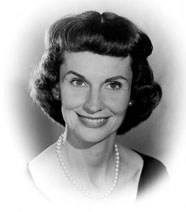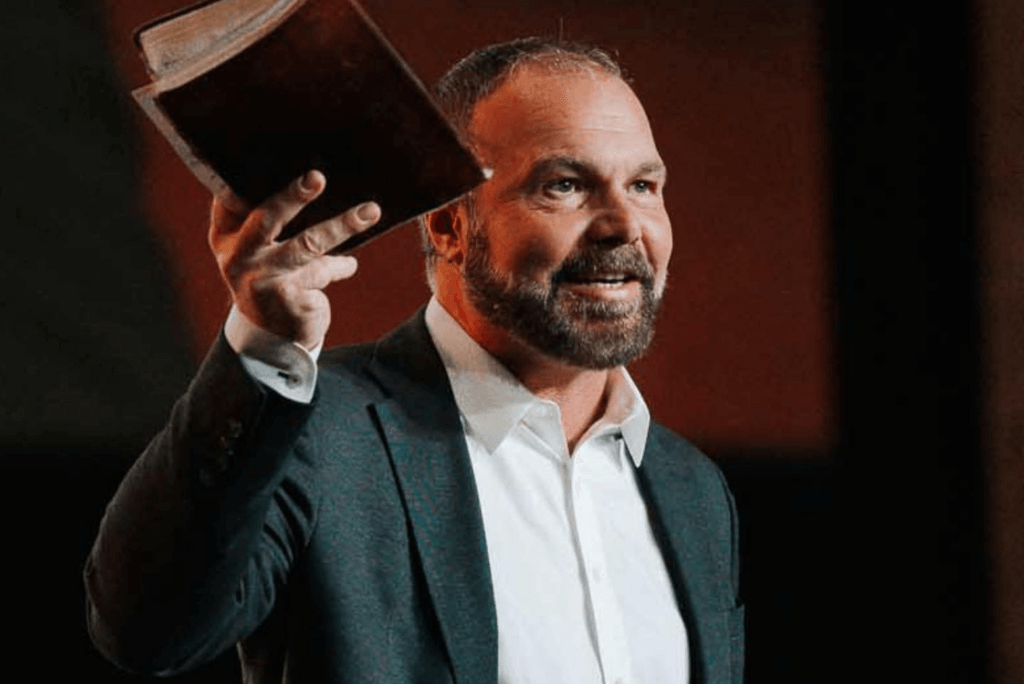 Billy’s ministry expanded, and in January 1945 he left his pastorate to become the first full-time evangelist of Youth for Christ, a ministry to youth and military service people. It was just the beginning of the couple’s difficult partings.
Billy’s ministry expanded, and in January 1945 he left his pastorate to become the first full-time evangelist of Youth for Christ, a ministry to youth and military service people. It was just the beginning of the couple’s difficult partings.
During those early years, before the children were born, Ruth traveled with Billy when their budget would allow. She often counseled and prayed with those who responded to the invitation to accept Christ. She especially had an eye for the down-and-out who were struggling to survive, and she would write to the inquirers for years. But then the children began to arrive, and the Crusades grew longer and bigger.
Ruth took to heart some words of advice that Cliff Barrows’ late wife, Billie, had received from “Ma” Sunday, the wife of evangelist Billy Sunday. Ma said that she had traveled with her husband to his evangelistic meetings because that is what he wanted. “But all my children are on the road to hell,” she tearfully told Cliff and Billie. She encouraged Billie to stay home and rear their children rather than travel with the Crusades. Billie told Ruth about that conversation.
Ruth took on the responsibilities of managing the Graham household, giving Billy the freedom to travel and preach wherever God called him.
Just before the birth of their first child, Gigi, in September 1945, Billy and Ruth moved from Illinois to Montreat, N.C., where Ruth’s parents had settled after leaving China. The Grahams lived with the Bells until they bought a house across the street just before their daughter Anne was born. Ruth (called “Bunny” as a child), Franklin and Ned were born in the following years. In the late 1940s, Billy’s ministry grew to include citywide campaigns and radio, leading to the incorporation of the Billy Graham Evangelistic Association in 1950.
Rather than complaining about staying behind, Ruth strived to make their home a shelter for Billy when he wasn’t traveling. When their home was overrun with curious tourists, she took matters into her own hands and compiled plans to build “Little Piney Cove,” a mountain home constructed of timber from abandoned log cabins. From the very beginning she took control of the project, going as far as getting a loan and buying property when Billy was in California. When the home was finished, she filled it with treasures from the mountains and from her travels.
Jean Wilson, a friend in the United Kingdom, remembers how Ruth searched out the small antiques and old Christian books that filled her home: “That is my biggest memory of her—all the collections she kept. She was a great pack rat, as she called it.” The pair often visited secondhand bookshops in England, and if Ruth found a book she wanted, “she’d pounce on it,” Wilson said. “She would be on her hands and knees, looking on the lowest bookshelf, or on a ladder trying to get up to the top shelf in these really old, old bookshops. … I’d end up with a car just packed with books.”
While Ruth dealt with architects and builders, furnishing the home, repairs around the house and extensive correspondence, she also raised five spirited children—who were not angels, as some might have thought—and helped her aging parents. Rearing the children when their father was away for months at a time proved challenging. When asked how she managed, she merely replied: “On my knees.” Her account of one particularly trying morning is a tale that mothers everywhere will understand.
“It had been one of those hectic nights, and I had overslept,” she wrote in her book “It’s My Turn.”
“Without fixing my hair or pausing for makeup, I hurriedly pulled on my bathrobe, lifted Franklin out of his bed without bothering to change him, and set him in the high chair. I proceeded to set the table hurriedly for breakfast so the children would not be late for school.
“That morning, every time Gigi opened her mouth to say something, Bunny interrupted. Finally, in exasperation, Gigi slammed down her fork.
—˜Mother!’ she exclaimed. “˜Between listening to Bunny and smelling Franklin and looking at you, I’m not hungry!'”
The Graham children grew up mostly unaware of their mother’s loneliness and struggles to manage the family when their father was away.
“I don’t think she ever talked about him leaving,” Franklin wrote in his book “Rebel With a Cause.”
“We knew he was preaching, but we thought that everyone’s father was away a lot. It’s just something we grew up with. She was always positive and would quote the old mountain man: “˜Make the least of all that goes, the most of all that comes.'”
Ruth sprinkled life with humor and observations. “I’ve never considered divorce,” she said once. “Murder, yes, but not divorce.” From childhood on, she was known to be mischievous. Whether chasing her sister Rosa with a dead bug in China or sliding a firecracker under Franklin’s bedroom door to wake him, she seemed to hold her father’s belief that Christians need not be glum and pessimistic. Not even the members of Billy’s Team were exempt from Ruth’s pranks. Once she took Associate Evangelist Grady Wilson’s travel sleeping pills and filled the capsules with mustard powder.
When Billy came home, Ruth tried to keep things peaceful and relaxing. She kept her schedule flexible and made time to help him find sermon illustrations, write books and create scripts for The Hour of Decision radio program.
Ruth’s rock-solid support of Billy’s ministry and her ability to manage their household on her own earned the respect of his Team. “There would have been no Billy Graham as we know him today had it not been for Ruth,” said Billy’s longtime assistant, T.W. Wilson.
No one respected Ruth more than Billy did.
“What I missed!” he wrote in “Just As I Am,” his autobiography, “And what Ruth missed by not having me to help her. Whenever I did get home, I got a crash course in the agony and ecstasy of parenting. If Ruth had not been convinced that God had called her to fulfill that side of our partnership and had not resorted constantly to God’s Word for instruction and to His grace for strength, I don’t see how she could have survived.”
An Evangelist at Home
Ruth looked for ministry opportunities of her own in Montreat.
“If she saw anyone in need or anyone who was especially hurting, she would reach out to that person,” said Dorothy Thielman, whose husband, the late Calvin Thielman, pastored the church the Grahams attended.
Tracy Taylor Bailey, conference manager at the Montreat Conference Center, said that in 1993, after her husband was killed in an automobile accident, Ruth invited Bailey and her three small children to the Graham home. “It was like going to Grandma’s house,” Bailey recalled. “She had fixed a dinner of kid-friendly food, and then she made a game, a scavenger hunt. She had taken things and hidden them throughout the house, and she gave us a list of things to look for. … We found all the things on the list, and she was just delighted, watching that.”
Tong and Sear Mei Chhay, owners of Ruth’s favorite restaurant, Tong Sing, also told of Ruth’s kindness. When they came to the United States from Cambodia 28 years ago, they were sponsored by Montreat Presbyterian Church, where the Grahams attended. Sear Mei’s brother was sponsored by Black Mountain Presbyterian, and at one point the two churches cooperated to buy a house for the Chhays. Tong recalled with tears how he discovered later that the down payment came from Ruth. “She was like my mother,” Sear Mei added.
“She has the heart of an evangelist,” said her daughter Anne in a 2002 interview. “Although her gift is often overshadowed by my father’s, Mother’s gift is exercised effectively on behalf of individuals. At her deepest core is the desire for individuals to know Christ in a personal and intimate way. My father preaches sermons to the masses, reaching thousands; my mother talks to individuals, loving them one by one.”
In the early 1970s, when the Graham children were grown, Ruth led a Sunday school class on the campus of Montreat College, where her son Franklin was a student.
Franklin’s friend Preston Parrish came to that class, along with some 150 other students. Ruth took an interest in Parrish, a new Christian, occasionally inviting him for dinner and giving him odd jobs working on the house.
“Ruth always had an eye for encouraging and helping somebody to come to the Lord,” Parrish said. “She would wait for God to straighten them out and then encourage them and help them grow. I guess she saw that in me—a new, young, zealous Christian who didn’t know anything but in whom God might have put a little potential for something.”
Ruth asked Parrish to pray with her that Franklin would surrender his life to Christ, and soon after, Franklin did, starting him down the path that led him to become the head of both BGEA and the relief and evangelism agency Samaritan’s Purse. Parrish, a former pastor and now BGEA vice president at large, says Ruth’s encouragement in the early years of his faith and marriage has had a profound impact on his ministry.
“She had a son who at that time was making her pull her hair out, so she knew how to keep up with rowdy kids,” he said. “Ruth gave you a vision of how you could grow in the Word of God, and you could not be with her without catching that vision. Scripture memory was not just some spiritual discipline. It was like breathing for her, and she thrived on it.”
“˜It’s My Turn’
With her children grown and married, Ruth was free to pursue her lifelong love of writing.
Although she was the wife of one of the world’s most famous evangelists, self-promotion was not her motive. Since her childhood, she had used writing to release emotions that she could not express to other people. In 1975, just before publishing her first book of poetry, “Sitting by My Laughing Fire,” she wrote to Decision magazine editor Sherwood Wirt, “I was terribly shy and diffident about these poems at first but have suddenly decided, “˜Shucks! If they express what I was going through or how I felt about what someone else was going through, it doesn’t really matter whether everybody else likes them.'”
Ruth’s longtime secretary Evelyn Freeland said, “Whenever there were requests from anyone to quote her materials, her response was always, “˜My writing is to be a ministry.'”
Ruth wrote to encourage the new Christian, the mother of the prodigal, the lost soul who hadn’t yet found the Savior—people in all walks of life.
Her poetry was practical, reflecting a life with loneliness and struggles but overflowing with trust in God. Sometimes whimsical, it often drew from the beauty of the mountains and forests surrounding her home in the Blue Ridge Mountains.
Her books “It’s My Turn” and “Legacy of a Pack Rat” are filled with short chapters that communicate nuggets of biblical truth and encouragement gleaned from her years as a wife, mother and Christian. She sprinkled in a variety of ancient and contemporary quotes, as well as bits of humor. “No person is absolutely unnecessary, ” she said in reference to disagreeable people. “One can always serve as a horrible example.”
In writing about her family and her life, Ruth did not hesitate to reveal her weaknesses. Many who read her column in Decision wrote to thank her for her down-to-earth advice.
“Every time I read something of hers, I feel like she is speaking directly to me,” one woman wrote. “Thank God for her and her willingness to be used for God’s work.”
The Best Years
In 1974, while making a pipe slide for her grandchildren at Gigi’s home in Wisconsin, Ruth fell and sustained serious injuries, triggering back and hip problems that would limit her activity for the rest of her life. Yet, while her body slowed down and was often in pain, her spirit remained vibrant and encouraging.
“I was so impressed,” said Dorothy Thielman of a visit to the Grahams’ home. “She was almost bedfast, but she maintained her sweet spirit and uncomplaining and utter trust that what the Lord had allowed in her life was for His own glory and her good. This is just the way she thought and the way she was.”
Eventually Ruth’s eyesight dimmed, but she kept sending letters to friends and continued to work on her writing with the help of her daughter Gigi and friends like Kerri Bruce, her executive assistant. And just as she had encouraged others to do as they faced the inevitable restrictions of aging, she prayed—for Billy and his ministry, for her family and friends, and for a wealth of people she’d known through the years.
Even in their later years, Billy and Ruth’s love for each other was obvious—in the way they teased each other and in the way their eyes lit up when they were together, their children have said. On their 60th wedding anniversary, Aug. 13, 2003, Ruth alluded to their early years. “There was some adjusting during the first few years, but it has pretty well adjusted now.”
Billy called their relationship a romance.
“We have a better relationship now,” he said. “We look into each other’s eyes and touch each other. It gets better as you get older. The secret is the Lord Jesus Christ—to have Him in the center of our lives.”
See an error in this article?
To contact us or to submit an article





















